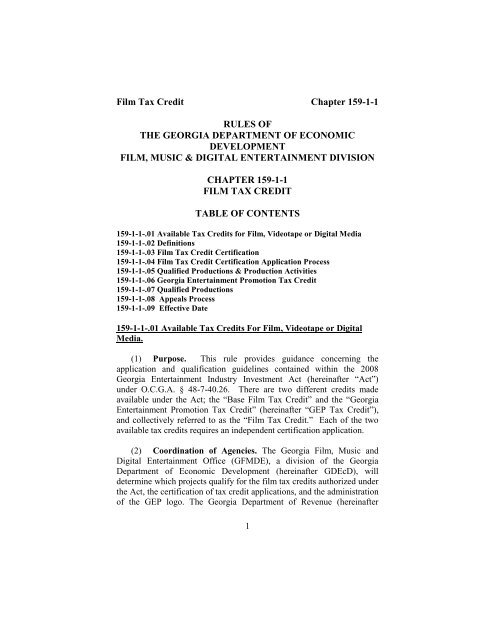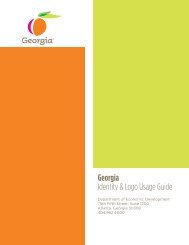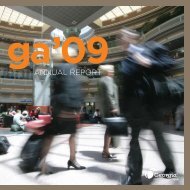Film Tax Credit Chapter 159-1-1 RULES OF THE GEORGIA ...
Film Tax Credit Chapter 159-1-1 RULES OF THE GEORGIA ...
Film Tax Credit Chapter 159-1-1 RULES OF THE GEORGIA ...
You also want an ePaper? Increase the reach of your titles
YUMPU automatically turns print PDFs into web optimized ePapers that Google loves.
<strong>Film</strong> <strong>Tax</strong> <strong>Credit</strong> <strong>Chapter</strong> <strong>159</strong>-1-1<br />
<strong>RULES</strong> <strong>OF</strong><br />
<strong>THE</strong> <strong>GEORGIA</strong> DEPARTMENT <strong>OF</strong> ECONOMIC<br />
DEVELOPMENT<br />
FILM, MUSIC & DIGITAL ENTERTAINMENT DIVISION<br />
CHAPTER <strong>159</strong>-1-1<br />
FILM TAX CREDIT<br />
TABLE <strong>OF</strong> CONTENTS<br />
<strong>159</strong>-1-1-.01 Available <strong>Tax</strong> <strong>Credit</strong>s for <strong>Film</strong>, Videotape or Digital Media<br />
<strong>159</strong>-1-1-.02 Definitions<br />
<strong>159</strong>-1-1-.03 <strong>Film</strong> <strong>Tax</strong> <strong>Credit</strong> Certification<br />
<strong>159</strong>-1-1-.04 <strong>Film</strong> <strong>Tax</strong> <strong>Credit</strong> Certification Application Process<br />
<strong>159</strong>-1-1-.05 Qualified Productions & Production Activities<br />
<strong>159</strong>-1-1-.06 Georgia Entertainment Promotion <strong>Tax</strong> <strong>Credit</strong><br />
<strong>159</strong>-1-1-.07 Qualified Productions<br />
<strong>159</strong>-1-1-.08 Appeals Process<br />
<strong>159</strong>-1-1-.09 Effective Date<br />
<strong>159</strong>-1-1-.01 Available <strong>Tax</strong> <strong>Credit</strong>s For <strong>Film</strong>, Videotape or Digital<br />
Media.<br />
(1) Purpose. This rule provides guidance concerning the<br />
application and qualification guidelines contained within the 2008<br />
Georgia Entertainment Industry Investment Act (hereinafter “Act”)<br />
under O.C.G.A. § 48-7-40.26. There are two different credits made<br />
available under the Act; the “Base <strong>Film</strong> <strong>Tax</strong> <strong>Credit</strong>” and the “Georgia<br />
Entertainment Promotion <strong>Tax</strong> <strong>Credit</strong>” (hereinafter “GEP <strong>Tax</strong> <strong>Credit</strong>”),<br />
and collectively referred to as the “<strong>Film</strong> <strong>Tax</strong> <strong>Credit</strong>.” Each of the two<br />
available tax credits requires an independent certification application.<br />
(2) Coordination of Agencies. The Georgia <strong>Film</strong>, Music and<br />
Digital Entertainment Office (GFMDE), a division of the Georgia<br />
Department of Economic Development (hereinafter GDEcD), will<br />
determine which projects qualify for the film tax credits authorized under<br />
the Act, the certification of tax credit applications, and the administration<br />
of the GEP logo. The Georgia Department of Revenue (hereinafter<br />
1
<strong>Film</strong> <strong>Tax</strong> <strong>Credit</strong> <strong>Chapter</strong> <strong>159</strong>-1-1<br />
“GDOR”) is the state agency responsible for implementing the proper<br />
application of the film tax credits.<br />
(3) Cross-Reference. This rule shall be construed in harmony<br />
with the Rules of the Department of Revenue, Income <strong>Tax</strong> Division,<br />
<strong>Chapter</strong> 560-7-8, Returns and Collections, Rule 560-7-8-.45, entitled<br />
<strong>Film</strong> <strong>Tax</strong> <strong>Credit</strong>, which governs, among other things, the application of<br />
financial thresholds and calculations of the tax credits to be allowed.<br />
Authority: O.C.G.A. §48-7-40.26.<br />
<strong>159</strong>-1-1-.02 Definitions.<br />
(1) „Animated‟ means, with regard to the GEP <strong>Tax</strong> <strong>Credit</strong>, the<br />
movement of the GEP logo while it is seen in the finished <strong>Film</strong>, TV, or<br />
Interactive Entertainment Work, as defined by GFMDE (See rule <strong>159</strong>-1-<br />
1-.02 below). The logo will be delivered to each customer in file formats<br />
that will provide producers of movie content, television content, music<br />
video content, and interactive video game content various versions of the<br />
GEP logo that will meet the requirement of Animated. Options will<br />
include a 3D-animated logo with several elements moving to form the<br />
GEP logo; a credit roll or scroll; a fade up and out; or a modified GEP<br />
logo promotion as agreed upon in advance by the production company<br />
or studio and GFMDE. The GEP logo may be placed before the opening<br />
titles; within the opening titles; within the content as product placement;<br />
or in the end credit roll; preferably before the below the line crew credit<br />
crawl. A deal memo, created by the requesting customer and specifically<br />
defining a proposed logo placement, must be reviewed, agreed to and<br />
signed by both GFMDE and the requesting Customer and must be<br />
executed prior to the Customer being awarded the GEP tax credit.<br />
(2) „Certification Letter‟ means a letter from the GDEcD<br />
indicating that the requirements to earn the Georgia “Base <strong>Film</strong> <strong>Tax</strong><br />
<strong>Credit</strong>” have been met for the specific project named. If the project has<br />
also been certified for the GEP uplift, a designation in the certification<br />
letter will indicate that the project is so eligible and qualifies for the<br />
additional 10% GEP tax credit.<br />
2
<strong>Film</strong> <strong>Tax</strong> <strong>Credit</strong> <strong>Chapter</strong> <strong>159</strong>-1-1<br />
(3) „Commercial Advertisements‟ means advertisements recorded<br />
on film, videotape or digital medium for multi-market distribution which<br />
extends outside the state of Georgia by way of broadcast television<br />
networks, cable, satellite, Internet, DVD, home video or motion picture<br />
theaters. Branding, marketing, promotion and/or e-advertising campaigns<br />
do not qualify. Certain animated productions do qualify.<br />
(4) „Console Game‟ refers to a form of interactive multimedia<br />
consisting of images and sounds generated by a video game console and<br />
displayed on a television or similar video/audio display system. The<br />
game itself is usually controlled and manipulated using a handheld<br />
device connected to the console called a controller. The display,<br />
speakers, console, and controls of a console can also be incorporated into<br />
one small object known as a handheld game console.<br />
(5) „Development‟ with regards to a film or television project<br />
means any activity or expenses incurred in order to prepare the project<br />
for the pre-production phase of the project or production. „Development‟<br />
also refers to the creation of a video game, the production process<br />
involved in producing a video game, referred to in the industry as video<br />
game development, as in the production process normally required to<br />
produce a video game.<br />
(6) „Feature <strong>Film</strong>‟ means, but is not limited to, a dramatic,<br />
comedic, animated or documentary film or high definition digital<br />
production with no commercial interruption, and originally intended for<br />
commercial distribution to motion picture theaters, directly to the home<br />
video and/or DVD markets, cable TV, video on demand, or any<br />
technology hereafter devised.<br />
(7) „<strong>Film</strong> <strong>Tax</strong> <strong>Credit</strong>‟ means the tax credits allowed pursuant to<br />
the 2008 Georgia Entertainment Industry Investment Act, O.C.G.A. §<br />
48-7-40.26.<br />
(a) The „Base <strong>Film</strong> <strong>Tax</strong> <strong>Credit</strong>‟ means the tax credit that provides<br />
a 20% tax credit for all qualified and certified entertainment productions,<br />
as certified by the GDEcD, which meet the minimum investment<br />
threshold, and is effective for all taxable years beginning on or after<br />
January 1, 2008.<br />
3
<strong>Film</strong> <strong>Tax</strong> <strong>Credit</strong> <strong>Chapter</strong> <strong>159</strong>-1-1<br />
(b) The „Georgia Entertainment Promotion <strong>Tax</strong> <strong>Credit</strong>‟ (“GEP <strong>Tax</strong><br />
<strong>Credit</strong>”) means the additional 10% tax credit which may be obtained by<br />
inclusion of a promotional Georgia logo in the completed production.<br />
The logo may be placed before or within the film or TV production‟s<br />
opening titles; into or out of bumpers, or in the end credits, preferably<br />
before the below the line crew credit crawl; over picture in the last three<br />
to five seconds of a music video; in various navigational areas within a<br />
video game, or as product placement in any of the above. (See rule <strong>159</strong>-<br />
1-1-.06 (1) below)<br />
(8) „Interactive Entertainment Work‟ means only the creation of<br />
massively multi-player online video games (MMOG), virtual worlds and<br />
certain console games as defined and approved by GFMDE and that<br />
meets the requirement of multi-market distribution via the Internet or any<br />
other channel of exhibition.<br />
(9) „Life of the Project‟ means from the initial release date through<br />
all ancillary uses, markets, and distribution channels worldwide that are<br />
under the direct control of the studio or production company, unless an<br />
exemption is agreed upon by GFMDE.<br />
(10) „Massively-Multi-Player Online Game‟ (MMOG) refers to a<br />
video game which is capable of supporting hundreds or thousands of<br />
players simultaneously. MMOGs are played on the Internet and feature<br />
at least one persistent world.<br />
(11) „Multi-Market Distribution‟ means commercial distribution<br />
within the State of Georgia and which must extend to multiple markets<br />
outside the State of Georgia.<br />
(12) „Music Video‟ means a filmed or videotaped recorded song,<br />
often portraying musicians performing the song or including visual<br />
images interpreting the lyrics.<br />
(13) „Preproduction‟ means the process of preparation for actual<br />
physical production and is considered to begin with the establishment of<br />
a dedicated production office, the hiring of key crew members such as a<br />
Unit Production Manager and/or Line Producer, and includes, but is not<br />
4
<strong>Film</strong> <strong>Tax</strong> <strong>Credit</strong> <strong>Chapter</strong> <strong>159</strong>-1-1<br />
limited to, activities such as location scouting, hiring of crew,<br />
construction of sets, etc. Preproduction does not include the process of<br />
„Development‟. (See rule <strong>159</strong>-1-1-.02 (5) above)<br />
(14) „Presentation‟ means the entire Feature <strong>Film</strong>, Television Pilot,<br />
Television Series, Television <strong>Film</strong>, Single Television episode or<br />
episodes, Television Specials, Music Videos, or Interactive<br />
Entertainment Work. This is not the same as a “pre-pilot” demo<br />
presentation.<br />
(15) „Principal Photography Start Date‟ means the first date of<br />
principal ongoing filming of significant portions of a qualified film that<br />
involves the main lead actors and the director.<br />
(16) „Production Company‟ is defined as a company that is<br />
primarily engaged in qualified production activities which have been<br />
approved by the Georgia Department of Economic Development and is a<br />
company that is solely and regularly involved in the creation and<br />
production of original film, television, or video game content in the State<br />
of Georgia.<br />
(17) „Promotional Trailers,‟ as defined by GFMDE, means behind<br />
the scenes specials and special edition DVD releases where credits are<br />
included.<br />
(18) „Television <strong>Film</strong>,‟ which may also be known as a „movie ofthe-week,‟<br />
„MOW,‟ „television special,‟ „made for television movie,‟<br />
„TV movie‟, or „TV mini-series,‟ means a production intended for<br />
broadcast on television, whether free or via a subscription-based service.<br />
(19) „Television Pilot‟ means the initial episode produced for a<br />
proposed television series that has a running time of at least thirty<br />
minutes in length (inclusive of qualified commercial advertisements and<br />
qualified interstitial content).<br />
(20) „Television Series,‟ which may also be known as episodic<br />
television, means a regularly recurring production intended in its initial<br />
run for weekly broadcast on television, whether free or via a<br />
subscription-based service, that has a running time of at least thirty (30)<br />
5
<strong>Film</strong> <strong>Tax</strong> <strong>Credit</strong> <strong>Chapter</strong> <strong>159</strong>-1-1<br />
minutes in length (inclusive of qualified commercial advertisements and<br />
qualified interstitial content).<br />
(21) „Virtual World‟ means a computer-based simulated environment<br />
intended for its users to inhabit and interact via avatars. These avatars are<br />
typically depicted as textual, two-dimensional, or three dimensional<br />
graphic representations of people, although other forms are possible<br />
(auditory and touch sensations for example). Some, but not all, virtual<br />
worlds allow for multiple users.<br />
Authority: O.C.G.A. §48-7-40.26.<br />
<strong>159</strong>-1-1-.03 <strong>Film</strong> <strong>Tax</strong> <strong>Credit</strong> Certification.<br />
(1) State Certified Production.<br />
Project Certification Requirement. Prior to claiming any <strong>Film</strong><br />
<strong>Tax</strong> <strong>Credit</strong>, each new film, video, television or video game project must<br />
be certified as meeting the guidelines and the intent of the Act. Projects<br />
are certified by the Georgia <strong>Film</strong>, Music & Digital Entertainment<br />
division (GFMDE) on a project by project basis. Producers may be<br />
asked to provide budget information, funding sources, distribution<br />
agreements, production schedules, and personnel information. Only one<br />
production company may claim the tax credit, per project, and the<br />
production company must be regularly and solely in the business of<br />
producing original film, television or video game content.<br />
(a) Projects Not Eligible for Certification.<br />
Certain categories of projects do not qualify for the <strong>Film</strong> <strong>Tax</strong><br />
<strong>Credit</strong> or the Georgia Entertainment Promotion including, but<br />
not limited to, the following:<br />
1. Live or recorded broadcast or sporting events (except to the extent<br />
that any footage used is a minor part of an otherwise qualifying<br />
production);<br />
6
<strong>Film</strong> <strong>Tax</strong> <strong>Credit</strong> <strong>Chapter</strong> <strong>159</strong>-1-1<br />
2. Live or prerecorded news programs & certain awards shows;<br />
3. Local TV talk shows originating in or airing from local TV stations;<br />
Call-in talk shows; Live talk shows;<br />
4. Projects and content consisting of footage not shot, recorded or<br />
originally produced in Georgia;<br />
5. Music scoring of content shot outside the state of Georgia;<br />
6. Corporate marketing, industrial or training productions;<br />
7. Pornographic films or videos;<br />
8. Trailers promoting theatrical films;<br />
9. Promos or interstitials promoting or marketing entertainment<br />
content that was not produced in Georgia<br />
10. Website development;<br />
11. Certain interactive productions; video game platform design and/or<br />
manufacturing for purchase; (but see Rule <strong>159</strong>-1-1-.05(4) below);<br />
12. Sole platform arcade video games;<br />
13. Games of Chance websites and other games of chance productions.<br />
14. Productions performed strictly „for hire‟, unless the hiring party<br />
waives its right to claim the tax credits;<br />
15. Any Qualified Production performed as a „work for hire‟, where the<br />
owner of the results of the Qualified Production has filed a<br />
Certification Application;<br />
16. Small scale games included in advertising, marketing and<br />
promotional websites or microsites; all forms of social media, social<br />
networking, marketing and brand promotion;<br />
17. Development costs, marketing and promotion expenses, distribution<br />
expenses, or any expenses incurred prior to preproduction or after<br />
post production of a feature film, television production or video<br />
game;<br />
18. Infomercials, Infotainment, Edutainment content and Solicitation<br />
based productions do not qualify as “entertainment” as defined by<br />
GFMDE.<br />
19. Auction based TV shows; and Political and Editorial based content<br />
do not qualify.<br />
20. Any expenditures made or incurred outside the state of Georgia and<br />
productions that do not meet the $500,000 minimum spend<br />
requirement.<br />
7
<strong>Film</strong> <strong>Tax</strong> <strong>Credit</strong> <strong>Chapter</strong> <strong>159</strong>-1-1<br />
(c) Certification Letter. Projects which meet the certification<br />
requirements will be sent a Certification Letter with a project<br />
certification number and the tax credit percentage level for which the<br />
project is eligible. Only one certification letter per project will be<br />
awarded. In the instance of Co-Productions or “work for hire” situations,<br />
both companies must provide an agreement as to which party will earn<br />
the tax credits. The Certification Letter or Letters must be included,<br />
along with required GDOR‟s Forms, with the production company‟s<br />
Georgia tax return when claiming the tax credit.<br />
Authority: O.C.G.A. §48-7-40.26.<br />
<strong>159</strong>-1-1-.04 <strong>Film</strong> <strong>Tax</strong> <strong>Credit</strong> Certification Application Process.<br />
(1) <strong>Film</strong> and television production companies or studios must<br />
submit a completed certification application not earlier than ninety (90)<br />
days prior to the scheduled start of principal photography and a shooting<br />
script to GFMDE for all feature films and television projects in order to<br />
be considered for approval. Video game and virtual world developers<br />
must submit a synopsis of each project(s) along with a certification<br />
application not earlier than ninety (90) days before the beginning of<br />
game development. Music video producers must submit song lyrics and a<br />
basic outline of the storyline elements along with a completed<br />
certification application not earlier than thirty (30) days prior to the<br />
scheduled start of principal photography. Commercial production<br />
companies must submit a listing of the television commercial(s) being<br />
produced and a completed certification application(s) not earlier than<br />
(30) days prior to the start of principal photography.<br />
(2) For projects which are not completed within the applicant‟s tax<br />
year (fiscal year or calendar year), a new project certification must be<br />
applied for each successive tax year. A certification letter must be<br />
obtained for each project for each year that tax credits are claimed. This<br />
rule applies to all multi-year entertainment productions that qualify for<br />
the <strong>Tax</strong> <strong>Credit</strong>s including, but not limited to, feature films, television<br />
series, other television productions, music videos, and video game<br />
development. Large, multi-year video game productions must apply and<br />
be certified for the base <strong>Film</strong> <strong>Tax</strong> <strong>Credit</strong> and the GEP <strong>Tax</strong> <strong>Credit</strong> each<br />
8
<strong>Film</strong> <strong>Tax</strong> <strong>Credit</strong> <strong>Chapter</strong> <strong>159</strong>-1-1<br />
year a video game production is in development or production. The GEP<br />
logo is required to be prominently displayed in agreed upon areas of the<br />
game and on the game company‟s website for the duration of the<br />
development phase and permanently embedded in the initial version and<br />
subsequent versions of the game, website, promotional materials and<br />
product packaging for the life of the game series.<br />
(3) All projects must be fully funded and have an existing multimarket<br />
distribution contract, or intend in good faith to seek such<br />
distribution outside the state of Georgia in order to qualify for the <strong>Film</strong><br />
<strong>Tax</strong> <strong>Credit</strong>. Qualified distribution includes international, national or<br />
regional distribution via broadcast television, satellite television, cable<br />
television, movie theaters, video on demand, retail outlets, home video,<br />
online video game subscription distribution, Internet distribution, DVD<br />
sales and distribution, or other forms of distribution that may hereafter be<br />
devised. If for any reason the project is not distributed to multiple<br />
markets outside the state of Georgia (thereby eliminating any<br />
promotional value of the GEP logo), the GEP <strong>Tax</strong> <strong>Credit</strong> will be<br />
disallowed.<br />
Authority: O.C.G.A. §48-7-40.26.<br />
<strong>159</strong>-1-1-.05 Qualified Productions & Production Activities.<br />
(1) The <strong>Film</strong> <strong>Tax</strong> <strong>Credit</strong> applies to all qualified and certified<br />
entertainment productions, as determined solely by GFMDE, including<br />
and limited to major studio feature films, independent feature films,<br />
television pilots; dramatic/comedic/reality television series; television<br />
films, TV specials, TV episodes, TV commercial advertisements; music<br />
videos; massively multi-player online video games (MMOG); certain<br />
console video games; virtual worlds; animated feature films and<br />
animated TV series; and the production of original musical scores used<br />
in any of these types of projects which have been approved and certified<br />
by the GFMDE.<br />
(2) Production companies must create, produce, and record original<br />
content made in the State of Georgia in order to qualify for the film tax<br />
credit. Work-for-hire service companies, post production houses, catering<br />
9
<strong>Film</strong> <strong>Tax</strong> <strong>Credit</strong> <strong>Chapter</strong> <strong>159</strong>-1-1<br />
companies, equipment rental houses, and motion picture laboratories are not<br />
eligible to receive the tax credit, but the producers employing them may<br />
include these expenditures as part of their project expenses.<br />
(3) Expenditures for the Development phase of projects do not<br />
Qualify for the <strong>Film</strong> <strong>Tax</strong> <strong>Credit</strong>. Projects must have entered<br />
„Preproduction‟ in order for expenditures to qualify for the <strong>Film</strong> <strong>Tax</strong><br />
<strong>Credit</strong>.<br />
(4) Studios designing platforms for outside game developers are<br />
not eligible for the film tax credit; however, the studio that buys these<br />
platforms from a Georgia vendor with a location in Georgia may claim<br />
them as an expense toward the production of a video game project.<br />
(5) Expenditures incurred in Georgia by producers for<br />
postproduction of projects produced and recorded in the state qualify for<br />
the tax credit, except for postproduction expenditures for Marketing and<br />
Distribution, which do not qualify.<br />
(6) Qualified commercial advertisements are eligible for the base<br />
<strong>Film</strong> <strong>Tax</strong> <strong>Credit</strong>; however, such commercial advertisements are not<br />
eligible for the GEP <strong>Tax</strong> <strong>Credit</strong>.<br />
(7) Any misrepresentation of project information may result in<br />
denial or revocation of certification.<br />
Authority: O.C.G.A. §48-7-40.26.<br />
<strong>159</strong>-1-1-.06 Georgia Entertainment Promotion <strong>Tax</strong> <strong>Credit</strong>.<br />
(1) The GEP <strong>Tax</strong> <strong>Credit</strong> is available only for major studio feature<br />
films, independent feature films, TV pilots, TV episodes;<br />
dramatic/comedic/reality TV series; television films, TV specials, music<br />
videos; certain console video games; massively multi-player online video<br />
games (MMOG); virtual worlds; and animated feature films and<br />
animated TV series which have been approved and certified by the<br />
GFMDE.<br />
10
<strong>Film</strong> <strong>Tax</strong> <strong>Credit</strong> <strong>Chapter</strong> <strong>159</strong>-1-1<br />
(2) The GEP <strong>Tax</strong> <strong>Credit</strong> certification applications must be submitted<br />
to the GFMDE. Applications will be reviewed and decisions will be<br />
issued. Projects that are not eligible or approved for the GEP <strong>Tax</strong> <strong>Credit</strong><br />
may still be eligible for the base <strong>Film</strong> <strong>Tax</strong> <strong>Credit</strong>. If an applicant has<br />
claimed the GEP <strong>Tax</strong> <strong>Credit</strong> and fails to include the GEP Logo in the<br />
original finished product per the agreed upon placement, the GEP <strong>Tax</strong><br />
<strong>Credit</strong> may be disallowed.<br />
(3) Once production of a qualified entertainment project has been<br />
completed in Georgia, the applicant or customer will request that the<br />
GEP Logo be delivered to said customer. The GFMDE will deliver the<br />
GEP Logo to each qualified GEP <strong>Tax</strong> <strong>Credit</strong> applicant on a DATA DVD<br />
disc at no charge. The GEP Logo will only be provided to customers that<br />
the GFMDE has certified as meeting the requirements to receive the GEP<br />
<strong>Tax</strong> <strong>Credit</strong>. The GFMDE must approve all logo placements, on a case by<br />
case basis. Furthermore, it is required that each qualified GEP tax credit<br />
applicant provide to GFMDE a DVD verifying the actual placement of<br />
the GEP Logo in the completed film, television production, music video<br />
or video game.<br />
Authority: O.C.G.A. §48-7-40.26.<br />
<strong>159</strong>-1-1-.07 Qualified Productions.<br />
(1) „Qualified Movie Production‟ means a feature film that has been<br />
granted certification by the GFMDE. Feature films must include a<br />
shooting script for review along with their film tax credit certification<br />
application and GEP application (if applicable). After completion of the<br />
project, a digital copy of the project containing the GEP logo must be<br />
sent to the GFMDE for review. Depending on the type of project and<br />
position within the movie titles or credits, an approximately five second<br />
exposure of the GEP logo, as provided by the GFMDE, must be included<br />
before or during the opening titles, as product placement within the<br />
production, or in the end credits, preferably before the below the line<br />
crew credit crawl in the end credit roll to earn the 10% uplift. The GEP<br />
logo must be included within the Presentation and in Behind-the-scenes<br />
specials and special edition DVD releases where credits are included.<br />
11
<strong>Film</strong> <strong>Tax</strong> <strong>Credit</strong> <strong>Chapter</strong> <strong>159</strong>-1-1<br />
(2) „Qualified TV Production‟ means television pilots, television<br />
series (in whole or in part), television films, and TV specials which have<br />
been given certification by the GFMDE. Television productions must<br />
include a shooting script for review with the GEP application. After<br />
completion of the project, a digital copy of the project containing the<br />
GEP logo must be sent to the GFMDE for review. To qualify for the<br />
GEP uplift, the production must include a five second Georgia<br />
promotional logo in the body of the program, per each broadcast 30<br />
minutes (inclusive of qualified commercial advertisements and qualified<br />
interstitial content); to be placed in the opening title sequence; as a<br />
bumper into or out of a commercial break; or in a prominent position in<br />
each single project‟s end credits; preferably before the below the line<br />
crew credit crawl; however, in no instances may the logo be shrunk or<br />
sped up in the credits without prior approval by GFMDE. The logo<br />
exposure time may be aggregated, if necessary, in order to meet the five<br />
second requirement and must be approved by GFMDE.<br />
(3) „Qualified Music Video‟ means music video projects certified<br />
by the GFMDE. To qualify for the GEP uplift, a minimum of a three to<br />
five second Georgia logo exposure must occur at the end of the finished<br />
product, as well as in all units sold, and included in all online<br />
promotions. The finished music video project must be submitted to the<br />
GFMDE for review before the GEP uplift will be approved. Music video<br />
producers must provide a song lyric sheet and general outline of the<br />
storyboard of the music video in advance of production or prior to<br />
approval of the GEP certification. Demonstrated Multi-market<br />
Distribution outside the state of Georgia is required.<br />
(4) „Qualified Interactive Work‟ means interactive entertainment<br />
that is limited to certain console video game products, a massively multiplayer<br />
online video game (MMOG), or a virtual world product produced<br />
in Georgia with multi-market distribution extending outside the State of<br />
Georgia. To qualify for the GEP uplift, interactive projects must include<br />
a total of fifteen seconds of Georgia promotional logo exposure in units<br />
sold, and up to a three second GEP logo adjacency in all online<br />
promotions. The fifteen second requirement may be aggregated and met<br />
through up to three separate and distinct displays of the GEP logo<br />
throughout the video game or virtual world product totaling fifteen<br />
seconds. Placement of the GEP logo within a video game or virtual<br />
12
<strong>Film</strong> <strong>Tax</strong> <strong>Credit</strong> <strong>Chapter</strong> <strong>159</strong>-1-1<br />
world must be discussed in advance with the GFMDE. Video game<br />
developers must provide a synopsis of the game architecture, navigation<br />
and story plotlines before the project can be certified.<br />
(5) In all cases, the GDEcD and the GFMDE will have authority<br />
for the certification of all projects; the denial of certification for any<br />
project; the denial of certification of the GEP; the agreed upon type,<br />
style, length and placement of the GEP logo, and the settlement of all<br />
disputes regarding the GEP.<br />
(6) Every effort will be made to negotiate in good faith with<br />
customers at all times in order to provide the greatest level of promotion,<br />
economic impact and jobs creation for the state of Georgia.<br />
Authority: O.C.G.A. §48-7-40.26.<br />
<strong>159</strong>-1-1-.08 Appeal Process.<br />
If the authorized applicant‟s certification application is disapproved by<br />
the GFMDE, or the approved applicant disagrees with the type of tax<br />
credits granted by the GFMDE, the applicant shall have the right to<br />
appeal. In the case of a disapproval of a certification application, an<br />
appeal may be made by sending a letter to the Manager of Community<br />
and Government Relations, Georgia Department of Economic<br />
Development, 75 Fifth Street, NW, Suite 1200, Atlanta, Georgia 30308,<br />
within thirty (30) days from the date of issuance of the denial letter by<br />
GFMDE. In the case of an appeal from a disagreement of the percentage<br />
of tax credit issued, such appeal shall be made by sending a letter to the<br />
same address as listed above within thirty (30) days from the issuance of<br />
the certificate of tax credit. Failure to request an appeal within thirty (30)<br />
days will finalize the denial decision and/or the percentage of the tax<br />
credit.<br />
Upon receipt of a timely letter of appeal, the Manager of Community and<br />
Government Relations will address the merits of the appeal and the<br />
nature of the dispute with the Commissioner of the GDEcD, who will<br />
make the final decision. The GDEcD shall make a report on the appeal to<br />
the GFMDE and the GDEcD shall issue a final order within sixty days<br />
13
<strong>Film</strong> <strong>Tax</strong> <strong>Credit</strong> <strong>Chapter</strong> <strong>159</strong>-1-1<br />
of the report. A copy of the final order will be issued to the appellant<br />
within ten (10) days after the date the GDEcD renders the final order.<br />
Any further appeals must be made before the Office of State<br />
Administrative Hearings.<br />
Authority: O.C.G.A. §48-7-40.26.<br />
<strong>159</strong>-1-1-.09 Effective Date. This chapter is applicable to taxable years<br />
beginning on or after January 1, 2008.<br />
Authority: O.C.G.A. §48-7-40.26.<br />
14

















